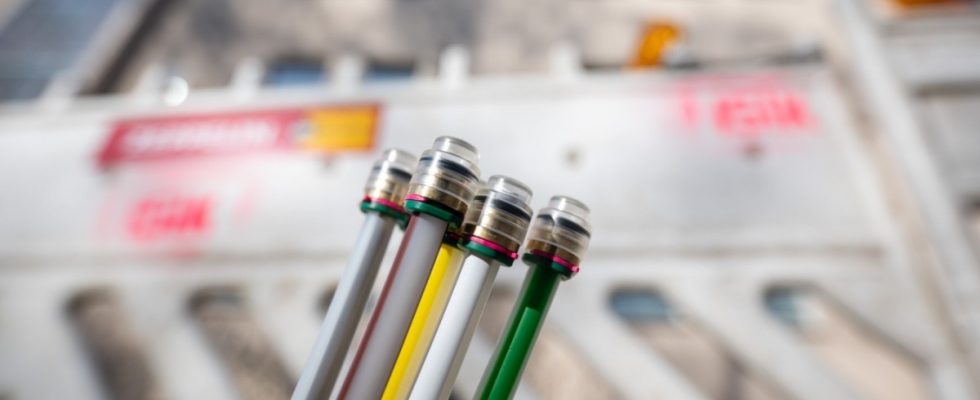That’s the thing with expectations. If they have a lot of time to grow, develop, or even puff themselves up, then there is always a danger involved. The fact that everything turns out differently in the end. This is exactly what happened with the German network providers’ expectations of the Federal Network Agency and its report on the double expansion of fiber optic networks.
Deutsche Telekom’s competitors are convinced that the former monopolist is exploiting its market power when expanding fiber optics. That he specifically lays cables or announces it where competitors are actually planning to do so or have already done so, thus “strategically overbuilding” the competitors’ networks, as they say – and thus torpedoing their business. The Federal Network Agency has now been investigating this for months and has collected cases in which this is exactly what happened. With the preliminary result that “a well-founded competitive assessment” is “not possible” so far. “There is still a great need for information,” says the head of the authority, Klaus Müller.
The Interim report published on Thursday includes 427 cases in which a superstructure (also called double expansion) is said to have occurred. Around half of the cases were filed by Telekom, the other half by its competitors. It has been shown that Telekom “more often reacts at short notice to the start of sales by an initially active competitor or only opens up lucrative core areas,” according to the Federal Network Agency. At the same time, the authority emphasizes that the information cannot be verified – and does not allow any conclusions to be drawn about the motives and strategies of the companies involved. In other words: There is now a report, but it doesn’t actually mean anything.
Opposing interpretations
The associations that represent Telekom’s competitors and have been pushing for the publication of the paper for weeks are correspondingly angry. “The Federal Network Agency is giving Telekom a devastating report,” explain the Federal Association of Broadband Communications (Breko) and the Association of Telecommunications and Value-Added Service Providers (VATM) in a joint statement. “Instead of drawing the right conclusions from the facts available to it, the authority – as apparently desired by the federal government – is exercising restraint and continues to play for time.” The associations accuse the Federal Digital Ministry (BMDV) and the Federal Network Agency of protecting the interests of Telekom, in which the federal government has a stake of around 30 percent.
They are also outraged because they cannot shake the feeling that the BMDV gave Telekom the opportunity to optimize the report again in their own interests. The Federal Network Agency had already sent a first draft of the interim report to the BMDV at the end of January. At that time this included around 300 cases. But instead of the ministry publishing this, new Telekom reports suddenly piled up on the Federal Network Agency portal, more than 100 were received within two months. Now Telekom reports and network operator reports are roughly balanced. The competitors accuse the ministry of giving Telekom “additional time” in order to manipulate the result in its own interest.
Telekom interprets the authority’s report completely differently. “The superstructure allegations are collapsing like a house of cards,” said a spokesman on Thursday. “Firstly, the number of cases is low given that there are 11,000 municipalities in Germany, and secondly, in half of the cases Telekom is overbuilt.” She sees herself as relieved by the interim report from the Federal Network Agency.
“A farce”
In a next step, the authority now wants to obtain “more detailed information” about Telekom’s expansion and planning activities. This in-depth analysis was actually already announced for the end of 2023. In any case, the company is initially spared any action by the state, for example in the form of an obligation to disclose its own expansion plans with a reasonable advance notice. Telekom’s competitors have been demanding such a reporting requirement for a long time. They describe the federal government’s behavior as “a farce.” They accuse her of putting the fiber optic expansion in Germany at risk by failing to take further measures.
In fact, the double expansion is considered to be problematic for the entire fiber optic system, not just for the “overbuilt” companies. On the one hand, this is because the construction industry’s capacity is extremely limited, so from the point of view of all market participants and also the federal government, priority should be given to building where there are no cables yet. Furthermore, Telekom often only relocates in the lucrative town center – in contrast to its competitors, who in most cases also want to develop more rural areas. This, in turn, is only worthwhile if the comparatively low costs per connection in densely built-up town centers with a large number of potential customers compensate for the costs of connecting more remote districts. And it is necessary so that the federal government can achieve its goal of equipping all households in Germany with fiber optics by 2030.

